What is DRILL?
DRILL stands for Disability Research on Independent Living and Learning. It is an innovative 5 year, UK-wide programme led by disabled people, for disabled people and funded by the National Lottery Community Fund (NLCF).
Launched in 2015, DRILL will conclude in August 2020. The Programme is led by Disability Action NI in partnership with Disability Wales, Disability Rights UK and Inclusion Scotland.
What do we do?
DRILL promotes coproduction and collaboration between disabled people and their organisations, academia, research bodies and policy makers. This will empower disabled people to have direct influence on decisions that impact on their independent living, particularly in relation to policies, legislation and services.
The programme has funded 35 coproduced research and pilot projects across the UK. More information about the projects can be found here.
Why?
The purpose of the Programme is to find solutions about how disabled people can live as full citizens and take part socially, economically and politically and how to achieve independent living. This evidence will be used to inform future policy and service provision, as well as give a greater voice to disabled people in decisions which affect them.
Wales DRILL Research Projects
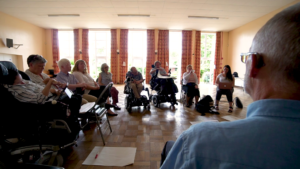
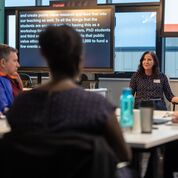
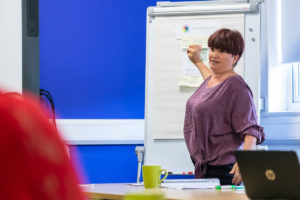
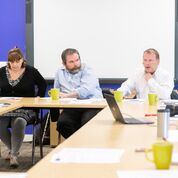
- Developing a toolkit that self-advocates can use to check if projects deliver what they promise
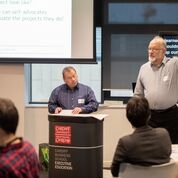
Using Evidence to Influence Change in Wales
Disability Wales is utilising research evidence and learning from the DRILL Programme to influence policy and practice change in Wales and beyond. Disability Wales has led a range of dissemination activities including:
- Research presentations at the Welsh Government’s Disability Equality Forum meetings, 2017
- A round table discussion with Eluned Morgan AM, on the employment of disabled people in Wales, May 2018
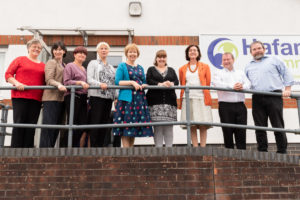
- A round table discussion with Jane Hutt AM (Deputy Minister and Chief Whip) and the DRILL Programme Board, October 2019
- The launch of the ‘Working with Peer Researchers: Developing Future Strategies’ research report at Disability Wales’ annual conference, with speakers Jane Hutt AM, Sophie Howe (Future Generations Commissioner for Wales) and Sara Lomri (Public Law Project), November 2019
- A day-workshop for early career researchers on coproduction in disability research, organised alongside Prof Debbie Foster, Cardiff University. This included presentations by DRILL Wales projects and a keynote talk by Prof Peter Beresford, January 2020.
DRILL Research Ethics Committee
The DRILL Research Ethics Committee is Chaired by Professor Alison Koslowski and operated by academics from across the four nations.
The purpose of the Committee is to grant ethical approval to those DRILL research projects that are not affiliated with a university.

DRILL Research Ethics Committee Members
Professor Alison Koslowski (Chair)
University of Edinburgh Q – Step Director, Senior Lecturer in Social Policy.
Dr Bronagh Byrne
Lecturer in Social Policy at Queen’s University Belfast.
Dr Jackie Gulland
Lecturer in Social Work, School of Social and Political Science, The University of Edinburgh.
Professor Sarah Parsons
Professor of Autism and Inclusion, Director of Research, Southampton Education School University of Southampton.
Dr Peter Scott
Senior Lecturer, Organisational Studies and Human Resource Management, Portsmouth Business School, University of Portsmouth.
Wales National Advisory Group (NAG)
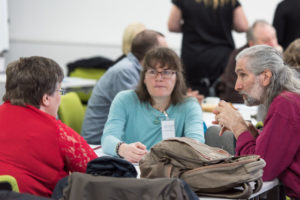
Members include academics, professional leaders, carers and other stakeholders. The majority are disabled people. The role of the National Advisory Group (NAG) has been to:
- Assess, sift and select research proposals to go forward for final selection by the Central Research Committee (CRC)
- Promote and disseminate DRILL research findings, and encourage uptake by policy makers and stakeholders
- Provide advice on any aspect of the Programme, as requested
- Contribute feedback for the purposes of monitoring and evaluation of the Programme
Membership of the Wales NAG
Chair: Prof Mark Llewellyn
Director, Welsh Institute for Health and Social Care, University of South Wales
Nick Andrews
Research and Practice Development Officer, Swansea University
Abu Askira
Business Support Officer, Care Council for Wales
Dr Andrew Dunning
Senior Lecturer, Public Health, Policy and Social Sciences, Swansea University
(Felix) Cunqiuang Shi
PhD student, Cardiff University
Prof Debbie Foster
Professor, Employment Relations and Chair of Research Ethics, Cardiff University
Viv Leach
Moncare Co-operative Coordinator
Joe Powell
Director, All Wales People First
Josie Powell
Postgraduate student (social work)
Dr Donna Reeve
Researcher, Office for National Statistics
Vin West MBE
Chair, Arfon Access Group
Member of the Coalition on Charging Cymru
Co-Chair of the Wales Alliance for Citizen Directed Support
PhD research on the Disability Employment Gap
In a collaboration between DRILL and Disability Wales, the ESRC and Cardiff Business School have funded a PhD research studentship award (2019-2023). Ruth Nortey – DRILL Researcher at Disability Wales – has been awarded this PhD opportunity. Forming part of the DRILL legacy, the research will enable further exploration of what works for disabled people in employment, and on coproduction in disability research, both central themes of the DRILL Programme.
Ruth’s research is entitled ‘What Works in Wales? Developing an evidence base to inform a kitemark for employers to address the disability employment gap’. The aim of the project is to identify an evidence base of good practice, and to contribute to the creation of a Disability Standard for employers. The research is jointly supervised by Prof Debbie Foster of Cardiff University Business School and Disability Wales. For more information, see http://www.drilluk.org.uk/news-fully-funded-phd-awarded/

